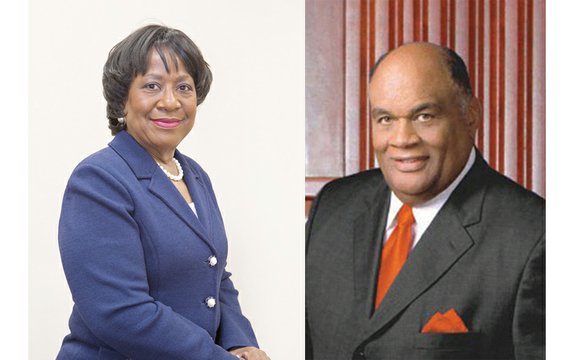Accreditation sanction lifted from NSU; extended at VSU
Jeremy M. Lazarus | 12/11/2015, 6:02 a.m.
Eddie N. Moore Jr. is wreathed in smiles, while Dr. Pamela V. Hammond is frowning.
That’s how the interim presidents of Norfolk State and Virginia State universities, respectively, are greeting the latest word from the accrediting body, the Southern Association of Colleges and Schools’ Commission on Colleges (SACS) based in Decatur, Ga.
Mr. Moore is in a festive mood after learning that SACS removed NSU from probation and restored the school to good standing — ending a threat to the school’s accreditation.
Meanwhile, Dr. Hammond is suffering the disappointment of having SACS extend VSU’s accreditation warning another six months, largely due to new concerns about the university’s ties with the school’s foundations.
The actions involving both institutions came Tuesday as SACS, which accredits schools in 11 states, wrapped up its winter board meeting in Houston.
Mr. Moore had forecast in October that NSU had resolved its accreditation problems, and his prediction proved accurate. The SACS board found that Norfolk State now meets all standards in lifting the probation, the most serious sanction before the loss of accreditation.
NSU was placed on probation in December 2014 after SACS found violations of 13 standards, ranging from control of finances to the faculty’s role in governance.
SACS gave NSU one year to turn things around, and Mr. Moore made sure the deadline was met to ensure that NSU would maintain accreditation, which is mandatory in order for students to receive federal tuition grants and loans.
The sanction was used to partially explain the recent sharp drop in NSU enrollment that has led to shrinking revenues.
As for VSU, the SACS board extended the warning against the Ettrick school for six months after finding additional issues need to be addressed.
VSU initially was warned based on noncompliance with four core accreditation standards involving the faculty, academic program coordination, financial audits and appropriate handling of student complaints.
Those issues apparently were taken care of because the warning is now based on four new concerns SACS wants VSU to address. The new concerns involve the school’s governance and financial control of its independent foundations that receive donations and are engaged in real estate development.
A recent audit of the VSU Real Estate Foundation raised concerns about financial controls on spending and credit card use, although there was no finding of wrongdoing.
Dr. Belle Wheelan, president of SACS, said the fact that only new issues were listed to explain the extension of VSU’s warning indicates the previous issues had been resolved.
A warning is a less severe sanction than probation, but does indicate significant noncompliance with standards, SACS states on its website.
Noting that VSU remains accredited, Dr. Hammond stated that VSU will continue to work closely with SACS to address any remaining concerns.
“We are committed to continuous improvement in the university’s programs and operations and will devote the necessary effort and resources to meet or exceed the … accreditation standards,” she said.







